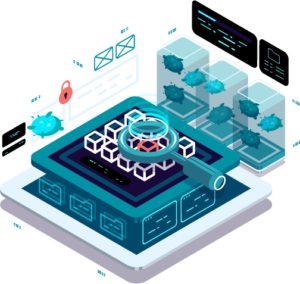WHAT IS ICS?
ICS (Industrial Control Systems) is a term that generally encompasses technologies such as SCADA (Supervisory Control and Data Acquisition), DCS (Distributed Control Systems), and PLCs (Programmable Logic Controllers). The primary purpose of ICS is to manage and control physical processes. In contrast, traditional information systems often manage data, whereas ICS enables the control of physical processes. Therefore, ICS systems are also referred to as cyber-physical systems. ICS is widely used in various industries, including oil and gas, energy transmission lines, manufacturing facilities, smart buildings, and cities.
WHY IS ICS SECURITY IMPORTANT?
Every Industrial Control System (ICS) constantly incorporates new technologies and software in both IT (Information Technology) and OT (Operational Technology) domains to enhance its functions and performance. These closed-loop systems aim to increase efficiency and improvement by merging IT and OT. However, this also makes them more significant targets for cyber threats. A common flaw in security solutions used in OT infrastructure is their inability to adequately protect control systems, especially older SCADA systems.
Furthermore, organizations must deal with increasing security challenges in new and emerging technologies like cloud computing, big data analytics, and the Internet of Things (IoT). Centralization has introduced new and unknown vulnerabilities to the cyber ecosystem. These emerging vulnerabilities have led to a significant rise in attacks on ICS systems that are vulnerable to many cyber threats. Such attacks can result in critical outcomes, including power outages, disrupted air travel, and production interruptions.
CYBER ATTACK EXAMPLES ON ICS SYSTEMS
Cyber attacks on ICS systems can lead to severe material damages and put human lives at risk. Below are some real examples of cyber attacks targeting industrial control systems:
Stuxnet: Regarded as one of the first major attacks on industrial control systems, Stuxnet targeted Iran’s nuclear program. It spread by exploiting vulnerabilities in Siemens SCADA systems, disrupting nuclear facilities and undermining Iran’s nuclear program.
Triton: This attack targeted industrial control systems in the oil and gas sector. It exploited a vulnerability in Schneider Electric’s Triconex control systems to target a water treatment plant. The attackers compromised security measures and posed potential threats.
Ukraine Blackout: Occurring in 2015, this attack targeted the electrical distribution system in Ukraine. Attackers infiltrated control systems, manipulated switching operations, and caused power outages for around 230,000 people.
Maroochy Shire Water Attack: This attack took place in Australia in 2000, targeting water treatment plants. A hacker infiltrated the industrial control systems of a water treatment plant and disabled pumps, negatively affecting the facility’s operations.
NotPetya: A global cyber attack in 2017 that targeted numerous companies. Attackers infiltrated a Ukrainian software company, using software updates to spread the NotPetya malware. These attacks include various types, such as Denial of Service (DoS) attacks, data breach attacks, malware attacks, physical attacks, and social engineering attacks. Such attacks can lead to production interruptions, system failures, and substantial financial losses.
HOW TO SECURE ICS SYSTEMS?
As technology advances, SCADA or ICS systems used in critical infrastructures also evolve and expand their applications. Attacks on critical infrastructures can potentially disrupt operations, slow down processes, and bring systems partially or entirely to a halt. Ensuring the security of such systems is a top priority.
Raising awareness about cybersecurity among employees operating in industrial units is the first and most crucial step. Most attacks start due to the carelessness or mistakes of these employees. Therefore, cybersecurity training is a mandatory necessity for all types of industrial companies.
The use of firewalls and up-to-date software is a crucial second step. Firewalls prevent threat actors from infiltrating the system and help monitor attempted attacks. Similarly, using up-to-date software helps protect the system against current threats and makes it more resilient against attackers.
Strong password usage cannot ignore the weakest link, the human factor, in any system. Strong password usage strengthens this link. All users with access to ICS systems must use complex and strong passwords. This makes it harder for attackers to compromise accounts and limits system access.
Cybersecurity audits: ICS systems should undergo periodic cybersecurity audits. These audits can help identify vulnerabilities in the system and prevent attack attempts. Additionally, the establishment of cybersecurity policies, determining security requirements and procedures, and being prepared for cyber attack scenarios all play a supportive role.
Data encryption, event monitoring, and logging: Encrypting sensitive data and keeping event logs can reduce the risk of data leakage. Encrypting transmitted and stored data is crucial. At the same time, monitoring events in the ICS system and regularly reviewing log files are important. Detecting abnormal activity as soon as possible speeds up the response time.
Finally, physical security is also crucial. Restricting and monitoring physical access is a significant step that supports cybersecurity. Server rooms and areas housing ICS components should have limited access. Being prepared for possible cyber attacks or incidents and periodically testing emergency response plans developed by responsible personnel is essential.
